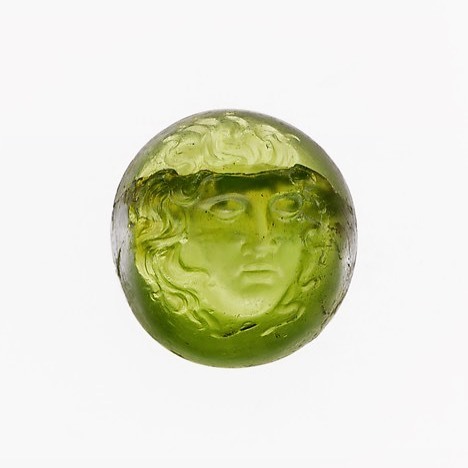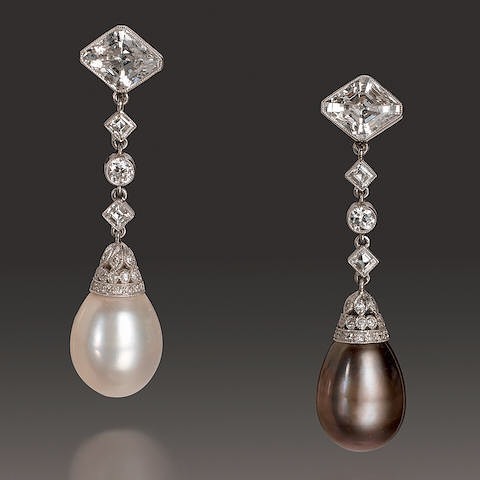Website: thepracticalgemologist.comI am an independent appraiser of gemstones and fine jewelry with many years of experience in retail, wholesale, manufacturing, design, and auction sectors of the jewelry industry. Education/Affiliation: MA Historical Archaeology, Graduate Gemologist and AJP (GIA, Carlsbad), NAJA member. Instagram:@practicalgemologist, Twitter: @ThePracticalGem
Don't wanna be here? Send us removal request.
Photo

I can’t think of a better way to usher in September than with a gorgeous and quintessential blue sapphire in a stunning Art Deco style setting from one of my favorite designers, Oscar Heyman. Happy birthday to my fellow September/sapphire babies!
#artdeco#lovestory#jewel#love#oscarheyman#luxuryjewelry#diamond#designer#september#luxury#jewelry#fashion#blue#ring#instajewelry#engagementring#jewelryaddict#engagement#ilovejewelry#sapphire#instagood#jewelrydesigner#jewelrygram#instagem#bluesapphire#style
93 notes
·
View notes
Photo

The head of the sleeping Medusa carved in peridot. The Roman made intaglio dates to ca. 1st century B.C.–3rd century A.D. From the MET collection . . . ___________________ #peridot #august #birthstone #ancient #ancienthistory #rome #ancientrome #antiquity #archaeology #medusa #MET #nyc #mythology #intaglio #carving #antiquejewelry #ring #jewelrygram #instagem #instajewelry #instagood #jewelryaddict #ilovejewelry
#ring#rome#august#ancienthistory#jewelryaddict#mythology#carving#birthstone#antiquity#jewelrygram#archaeology#nyc#instagood#medusa#ancientrome#met#ilovejewelry#peridot#ancient#instagem#instajewelry#antiquejewelry#intaglio
65 notes
·
View notes
Photo

Beautiful greens by Victor Velyan. A large peridot surrounded by gold and silver with an unusual green patina and diamond accents. Available from Skibell Fine Jewelry.
#jewelryaddict#instagood#green#ring#instajewelry#peridot#august#victorvelyan#coloredstones#jewelrygram#gold#instagem#gem#birthstone#jewel#ilovejewelry#diamond#fresh#jewelry#diamondring
32 notes
·
View notes
Photo

Boucheron jewelry really is the stuff that dreams are made of. Mounted with a 78.33 carat Santa Maria aquamarine and around 2000 cultured pearls, the Baïkal necklace is an ode to imperial jewels.
#hiverimperial#necklace#style#pearl#jewelrygram#jewelryart#designer#jewel#fashion#instajewelry#jewelry#ilovejewelry#boucheron#jewelryaddict#instacouture#couture#highjewelry#blue#jewelrydesigner#designerjewelry#imperial#diamond#aquamarine#luxury#modernimperial#gem#empress#luxuryjewelry
192 notes
·
View notes
Photo

•The name ruby comes from the Latin word ruber, which means “red”. •Ruby is the birthstone for July and the gem for the 15th (in the U.S.) and 40th anniversaries. •Ruby is the most valuable variety of the corundum mineral species. •Chromium is the trace element that causes ruby’s red, which ranges from an orangey red to a purplish red. •The strength of ruby’s red depends on how much chromium is present—the more chromium, the stronger the red. …. The Carmen Lúcia Ruby. The 23.1-carat Burmese ruby, set in a platinum ring with diamonds was donated to the Smithsonian by businessman and philanthropist Peter Buck in memory of his wife Carmen Lúcia. The stone was mined from the famous Mogok region of Burma in the 1930s. While sapphire, emerald and diamond gems weighing hundreds of carats exist, high quality Burmese rubies larger than 20 carats are incredibly rare.
#instagood#burma#ruby#jewelryaddict#julybirthday#museum#instajewelry#july#birthstone#smithsonian#diamond#instagem#burmaruby#julybirthstone#ilovejewelry#vintagejewelry#antique#red#antiquejewelry#gemology#jewelry#jewelrygram#ring#vintage#vintagestyle
81 notes
·
View notes
Photo

Renaissance Revival style brooch-pendant made by the firm of Castellani in Rome circa. 1860-1900. The brooch-pendant is gold, with enamel, rubies, sapphires, and pearls. Castellani was famous for jewelry inspired by historical gold work including medieval and Renaissance styles. Currently the brooch-pendant is part of the V&A museum collection.
#renaissance#brooch#musuem#style#instagem#artisan#pearl#england#history#sapphire#jewelryaddict#instajewelry#italian#jewelry#luxury#jewelrydesigner#gold#rome#ruby#jewelrygram#ilovejewelry#castellani#jewelryartist#antiquejewelry#jewelryhistory#london#pendant#vintagejewelry#instagood#jewelryart
121 notes
·
View notes
Photo

Gorgeous American made late-19th century 14 karat gold pendant featuring an ethereal moonstone and ruby accents. Available from Macklowe Gallery ltd.
#gold#pendant#luxury#jewelry#goldjewelry#vintagestyle#june#birthstone#luxuryjewelry#vintage#vintagejewelry#antiquejewelry#instajewelry#jewel#jewelrygram#gemstone#jewelryaddict#jewellery#necklace#antique#ilovejewelry#style#ruby#gem#moonstone#fashion#instagem#american#july
45 notes
·
View notes
Photo

Retro era 1940s Acanthus Leaf Clip Brooches featuring rubies and diamonds set in gold by American jewelry firm Raymond Yard inc. Available from Jacob’s Diamond & Estate Jewelry.
#jewelrydesigner#instajewelry#instagood#raymondyard#instadiamond#retro#instagem#vintage#nyc#retrojewelry#gem#jewelry#vintagejewelry#july#vintageglamour#designer#jewelryaddict#vintagestyle#jewelrycrush#brooch#ilovejewelry#diamond#gold#thebroochisback#raymondyardjewelry#julybirthstone#jewel#ruby#birthstone#jewelrygram
19 notes
·
View notes
Photo

Welcoming July with something spectacular. An absolutely stunning ring by Buccellati. Featuring a Burmese ruby surrounded by a lattice of diamonds. Available from Steven Fox Jewelry.
#luxuryjewelry#jewelry#jewelryaddict#luxury#designerjewelry#gold#designer#birthstone#gem#rubyring#ilovejewelry#july#jewelrydesigner#fashion#julybirthstone#julybaby#diamondring#ruby#instagood#style#jewelrygram#gemstone#instajewelry#burmeseruby#diamond
93 notes
·
View notes
Photo

Sumptuous gold surrounding cultured pearls and purple sapphires. Earrings by Paula Crevoshay.
#goldjewelry#oneofakind#ilovejewelry#jewelryaddict#junebirthstone#etruscan#purple#jewellery#designerjewelry#earrings#jewelrygram#june#pearl#sapphire#gold#paulacrevoshay#purplesapphire#designer#jewel#instagem#jewelry#instagood#instajewelry#bluepearl#jewelrydesigner#couture#fashion#crevoshay
47 notes
·
View notes
Photo

Non nacreous pearl from the “spiny oyster”: 6.97 ct bicolored white and pink Spondylus pearl with a beautiful reflective blue coloration a flame structure when viewed in certain directions under a single white light source. Photo by Robert Weldon/GIA. The spiny oyster shells occur in reds, oranges and purples depending on their diet. Because of their vibrant colors spiny oyster shells are often used in jewelry; especially Native American jewelry.
#spinyoyster#birthstone#ilovejewelry#collector#instagem#junebirthstone#gemstone#gem#jewelry#jewelryaddict#jewelrygram#seashell#instajewelry#instagood#museum#mineral#gemology#rare#pearl#june
24 notes
·
View notes
Photo

Total jewelry crush on this two toned gold 1940s retro Tiffany & Co. brooch. Available from Nadine Krakov Collection.
#goldjewelry#designerjewelry#jewelry#retrojewelry#jewelrygram#vintagestyle#vintagejewelry#jewelryaddict#tiffanytuesday#designer#ilovejewelry#jewelrycrush#vintageglamour#tiffanys#tiffanyandco#brooch#jewelrydesigner#instajewelry#jewel#vintage#gold#retro
10 notes
·
View notes
Photo

We all could use more rainbows in our lives 🌈 The Black Rainbow Tiara by Solange Azagury-Partridge. An open work tiara set with an oval black Opal surrounded by tiers of Diamonds and precious stones in blackened 18ct white gold. ❤️💛💚💙💜💗
#sapphire#opal#instagood#luxuryjewelry#jewelrydesigner#blackrainbow#jewelry#pride2017#rainbow#solangeazagurypartridge#ilovejewelry#blackopal#pridemonth#pride#instajewelry#australia#crown#rare#jewel#diamond#luxury#instagem#jewelrygram#tiara#jewelryaddict#gemstone#preciousgems#style#fashion#gem
114 notes
·
View notes
Photo

Shelled mollusks produce a “pearl” when a microscopic irritant is trapped within its mantle folds. The mollusk creates a pearl sac to seal off the irritation. This is a part of the mollusk’s defense mechanism against a potentially threatening irritant such as a parasite inside the shell, or an attack from outside that injures the mantle tissue. The mollusk’s mantle deposits layers of calcium carbonate in the form of the mineral aragonite or a mixture of aragonite and calcite that are held together by an organic horn-like compound called conchiolin. This combination is called nacre. Natural pearls are nearly 100% nacre (calcium carbonate and conchiolin). This secretion process is repeated many times, eventually producing a pearl. Natural pearls are quite rare. This means that hundreds of pearl oysters or mussels must be gathered and opened just to find even one wild pearl. For this reason pearls were able to fetch extraordinary prices in the past. With the advent of cultured pearls there was a dip in the value of pearls as a reaction to the fact that they were now available to more than just the elite classes. In recent years there has been a steady increase in the value of natural pearls as buyers are drawn to the rarity of natural pearls once again. “Gem” quality natural pearls are still very rare. Values are determined by size, shape, color, quality of surface, orient and luster.
*A pair of belle époque natural pearl and diamond pendent earrings, circa 1910 Sold by Bonhams in 2006.*
#birthstone#gem#naturalpearl#vintagejewelry#gemology#earrings#rare#luxury#fashion#pearl#instagem#designer#junebirthstone#jewelryhistory#beauty#diamond#belleepoque#jewelryaddict#instagood#science#edwardian#ilovejewelry#june#jewel#bonhams#jewelry#jewelrygram#vintage#style
59 notes
·
View notes
Video
instagram
•Alexandrite is a variety of chrysoberyl know for its dramatic color change from purplish-red under incandescent light to bluish-green in daylight or fluorescent light. •Impurities of chromium cause alexandrite to transmit red and green light equally well. •The stone is named after Czar Alexander II. •The original mining location for alexandrite is Russia, however, gems have also been found in Brazil, Sri Lanka, Tanzania, Madagascar, Zimbabwe, India, and Burma. •Alexandrite over 2 carats is considered large. Stones over 5 carats are extremely rare. *The 17.08-carat Whitney Alexandrite is a raspberry color under incandescent light and a teal (green-blue) color under daylight. It is one of the finest known alexandrites from the Hematita Mine in Minas Gerais, Brazil. The stone was gifted to the Smithsonian in 2009 by Coralyn Wright Whitney and is on display at the National Museum of Natural History.*
#gem#jewellery#instajewelry#jewelrygram#brazil#june#russian#czaralexanderii#stunning#history#jewelryaddict#smithsonian#instagood#chrysoberyl#birthstone#gemstone#alexandrite#ilovejewelry#jewelry#museum#rare#gemology#instagem#style#luxury#imperialrussia#jewel
33 notes
·
View notes
Photo

•Feldspars are the most diverse and widespread minerals in the earth’s crust. •Moonstone is the most familiar gem-quality member of the feldspar group. •Moonstone is a part of the feldspar group, and is a variety of the species orthoclase within that group. •Moonstone is a composite of two feldspar minerals, orthoclase and albite. After the orthoclase and albite have come together they cool and separate into alternating layers that are stacked on each other. •Moonstone is known for having an ethereal misty glowing look. This phenomenon is called adularescence.
•Adurlarescence is occurs when light falls between the stacked layers of orthoclase and albite and scatters it.
•Rainbow moonstone has a multicolored adularescence over a light bodycolor. However it is not actually moonstone. It is a variety of labradorite (often from Madagascar) and rainbow moonstone is a trade misnomer.
*The necklace features moonstones and labradorite set in silver. It was made by Danish Designer Georg Jensen between 1915-1927 and currently resides at the Victoria & Albert Museum.*
#birthstone#gemology#gemstone#danish#instagood#labradorite#jewelrygram#geology#jewelryartist#junebirthstone#vintage#jewelrydesigner#instajewelry#jewelry#gem#moonstone#georgjensen#instagem#felspar#june#ilovejewelry#designer#style#vintagejewelry#jewelryaddict#artnouveau
112 notes
·
View notes
Photo

•The hard clams (Mercenaria mercenaria) or Quahogs are an edible marine bivalve mollusk, also known as a round clam, or hard-shell (or hard-shelled) clam. • The clams are native to the Atlantic shores of North America from Canada to Georgia, especially on the coast of the New England states, and can also be found along California’s Pacific coast. •Quahogs sometimes produce non-nacreous porcelain-like pearls. •Quahog pearls occur in a variety of colors ranging from white to brown and from faint pinkish purple to dark purple. •Like many other natural pearls, quahog pearls are rarely spherical. Button shapes with flat bases are the most common. •It is estimated that only 1 in 100,000 Quahog clams actually produce a pearl of any kind. Suite of 45 Quahog Pearls, from the Coastal waters of the North Atlantic. Sold at Bonhams in 2014
#fashion#jewelrygram#naturalpearl#style#pearl#june#earrings#americanpearl#purple#designer#instagem#gemology#necklace#gem#jewel#jewelryaddict#jewelrydesigner#quahogpearl#jewelry#quahogs#clam#birthstone#gemstone#instajewelry#ilovejewelry#instagood#purplepearl#rare#newengland
45 notes
·
View notes